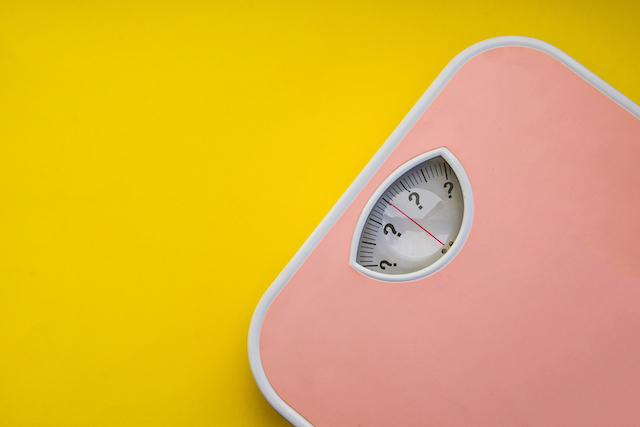Are you someone who jumps on the scales at every opportunity?
In my 20 years of clinical practice, I have never weighed a client. In fact, if you’re a chronic weigher, I encourage you to step away from the scales—for good.
Here’s why.
You’re only weighing your self-esteem
For the vast majority of people—women especially—when they weigh themselves regularly, what they’re really doing is weighing their self-esteem. When you have linked your weight to your worth, the outcome of your daily weigh-in can completely change the course of your day. You either jump on those scales and feel great about yourself or your entire day is derailed and you’re left feeling lousy. If you come away feeling lousy, it can affect the choices you make throughout the rest of the day—from the food choices you make to whether you feel like socialising or not. Beyond this, it can affect the way you talk to yourself in your own head, potentially further cementing self-judgement and criticism.
The thing is, you are so much more than your weight. That number doesn’t tell you anything about your beautiful heart, the light in your eyes, your generous spirit or how loved (and loveable) you are in this world. When you link your self-worth to your weight and use it as your main measure of progress, you set yourself up to feel like you’re failing because—as you’ll see in the next points—your weight isn’t the best measure of your health and it can be affected by numerous factors. Focus on the things that you can control, like taking the very best care of yourself.
It’s common for there to be fluctuations related to fluid
Just because you weigh a little more one day, doesn’t even mean that it’s body fat. It’s entirely common for your body weight to fluctuate depending on how much fluid you’re retaining. Changes can occur across our menstrual cycle and/or with the kinds of foods (and fluids) we’re consuming. But you don’t think about this when you jump on the scale. You just assume that the number has jumped up (or down) because you’ve gained (or lost) body fat. It’s impossible for you to put on a kilogram or more of fat in a day. The body just doesn’t work this way.
Your muscle to body fat ratio (i.e. your body composition) can affect your overall body weight
You may have heard the phrase “muscle weighs more than fat” and wondered how that could be. Of course, a kilo of body fat versus a kilo of muscle will weigh the same, the key difference is how much space they take up. Muscle is much denser than body fat so you can effectively weigh more but appear leaner when you build muscle in your body. Have you ever seen those images of a group of women who all weigh the same on the scales but have vastly different body shapes and sizes?
You can see changes in your body by how your clothes fit you
It’s possible for there to be positive changes in your body without there being much change (or any change) in your total body weight. Rather than using weight as a measure of progress, I encourage noticing how your clothes are fitting. I’ve had numerous clients who noticed their clothes loosening significantly, yet when they decided to check their scale weight, it didn’t seem to reflect the extent of the changes they were noticing in their physical body. And then they felt lousy, despite the fact that their clothes were looser and they were (previously) feeling amazing.
So why weigh yourself at all? Your health is so much more than just your weight. It’s how you feel on a daily basis—how much energy you have, your clarity of mind, the way your digestion works, your emotional landscape and whether your hormones cause you chaos or not. And your body will naturally find its most comfortable weight when you are healthy, which means you have to be healthy to lose weight and not the other way around.
So, if you have a set of scales in the bathroom, I encourage you to find a new home for them. Maybe in the garage as your new luggage scales or perhaps in the bin!


